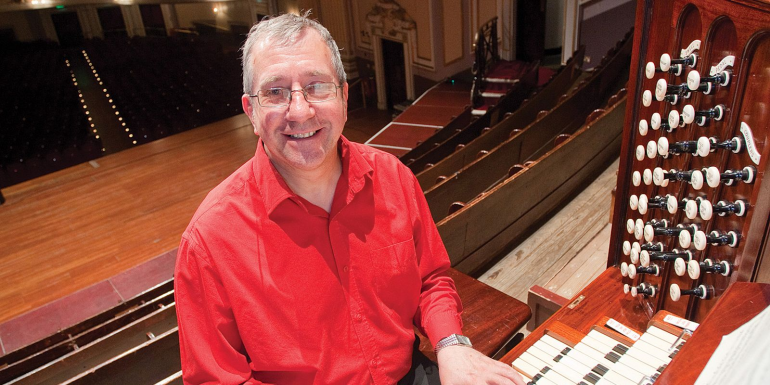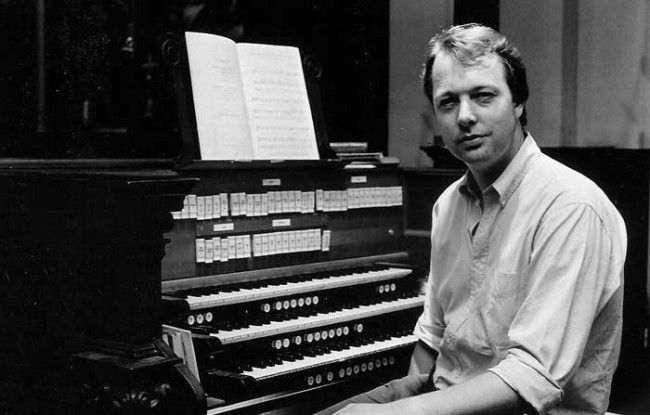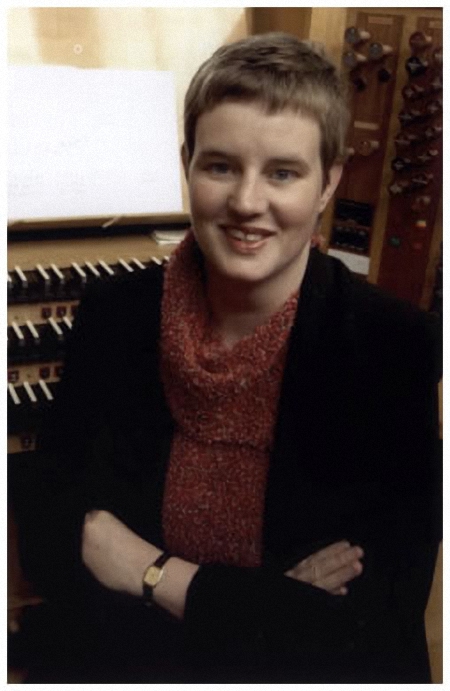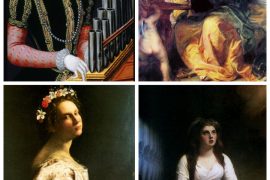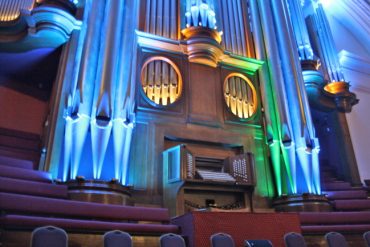For years, a favourite CD of mine for maintaining morale on long car journeys has been John Kitchen playing the organ of the Edinburgh Usher Hall in a perfect eclectic Town Hall recital programme. He is Edinburgh City Organist, Director of Music at Old Saint Paul’s Episcopal Church, and continues as University Organist at the University of Edinburgh, after retiring as Senior Lecturer there. He’s much in demand as a continuo player, accompanist, lecturer, writer, adjudicator, reviewer and recording artist – find the Usher Hall CD along with his many other recordings on the Delphian label.
He was awarded an MBE in the June 2016 Queen’s Birthday Honours for services to music, and last July he was elected President of the Incorporated Association of Organists, a nationwide federation of organists’ societies in the UK.
John’s students once devoted a Facebook page to his pedal trills: ‘ My congregation is used to this sort of thing’ he says, ‘and they don’t turn a hair. Well, Bach does one in the ‘Dorian’ fugue…’
Time for my five questions:
Which piece of music are you studying at the moment and why?
I give lots of concerts and so am always working on something: either learning new pieces, or reworking old ones. In my Usher Hall ‘Get Organised’ January 2020 series (not my title but we have used it since 2003!) I am going to resurrect the first movement of Whitlock’s Sonata in C minor—a big, powerful piece which recalls Rachmaninov—as well as Hugh Blair’s Elgarian Short Sonata in G. (Blair was the guy who gave the first performance of Elgar’s Organ Sonata, and sadly made a mess of it!) I also mean to re-learn the Reubke Sonata on the 94th Psalm soon, which I love but haven’t played for years. Because I play so many recitals I have to keep a pretty large repertoire at my fingertips, and for much of the time it’s a case of polishing up pieces rather than learning them. But I do also like to learn one new piece for most recitals. My Usher Hall audiences submit requests from time to time, and so I quite often have to learn new repertoire. Some requests are really quite unusual and imaginative (Edinburgh audiences being so sophisticated!) and have included the fiendish organ solo from Janacek’s Glagolitic Mass and a minimalist piece, Shalom, by the Dutch composer Toon Hagen. So it’s not all the Widor Toccata and Jesu Joy!
What has been your best experience as an organist?
Oh, this is very difficult to say, as I’ve had so many great experiences, playing and hearing wonderful instruments both in the UK and overseas. However, I would say first of all that playing service music in church, particularly leading hymns, never fails to give me a thrill, as it has done for nearly 50 years! I must have played (say) Hyfrydol hundreds of times, but it never fails to get to me. Lots of colourful registration, of course, and a pedal trill on the dominant at the beginning of the last line!
Apart from liturgical playing, I’ve had countless great organistic experiences. Some years ago a group of us visited the church of St Maximin la Sainte-Baume, which contains a celebrated organ built by Isnard in 1772-4—a very late and wonderful example of the French Classical style of organ. I had heard this instrument on CD, but at last heard it in the flesh, played by Pierre Bardon. (You can see images of him online standing inside this sensational instrument.) I was utterly overwhelmed by the indescribably exciting sound of the grand jeu and rather surprised my friends by bursting into tears.
The infinite variety of organ types, and the music associated with them, is the best thing about being an organist. I can’t help feeling that we have more fun than other instrumentalists!
What has been your worst experience as an organist?
This was probably the time when the seat of my pants stuck firmly to an organ bench which had just been varnished and wasn’t quite dry—this in London, I’d better not say where. (Fortunately, it happened in rehearsal, not in the concert.) Another time I was about to give the opening recital on a wonderful transplanted Father Willis organ in a Glasgow church: the minister had announced me, and the plan was that I was to launch straight into the first piece with a dramatic flourish. But at that very moment the power to the motor cut out, and I had to shout out from the gallery “Is there an electrician in the house?” (I’m not making this up.) Amazingly, there was, and he managed to restore the power; but not for half an hour or so. The large audience, all dying to hear their new organ, were therefore invited to the church hall to have tea and buns before the recital rather than after, while this guy got the power restored. I once over-heated the blower on the famous organ of Merseburg Cathedral near Leipzig; a smell of smouldering rubber began to emanate from behind the organ as I reached the final triumphant chords of Liszt’s Weinen, Klagen variations, with most of the 90-odd stops drawn, including the great 32’!! After the last chord, the organ conked out; mercifully no real damage was done, but the motor had burnt out. This, I may say, was in the 1980s, in the days of the GDR, and I thought I might be sent to the salt mines of Siberia, never to be seen again. (The Merseburg organ subsequently underwent a full restoration—although not just because of me.)
What’s the best piece of advice you were given by an organ teacher? (and who was it?)
I had piano lessons from the age of six, but as an organist was largely self-taught, from about the age of eight or nine. I had my first ever organ lessons from Gillian Weir in my 20s when I was preparing for my FRCO! We worked on French Classical music, as well as Bach, Buxtehude and other essential repertoire. Gillian wasn’t particularly interested in teaching technique—she expected you to have it which is fair enough—but she was marvellous at instilling a sense of style and elegance in one’s playing. I think that’s what I gained most from, rather than any one specific piece of advice.
What would be your own best piece of advice for student organists?
Various things: prepare your music thoroughly, and then play it with real confidence and enjoyment (easier said than done!) If you are enjoying it, so will the audience. As an organist, you often have to play unseen by your listeners—no other musicians have to do this—and so you have to learn how to put the music across as vividly as possible. In order to do this, you may have to be bold and exaggerate things a bit, although never in such a way as to distort the music. (I can think of one celebrated organist who is guilty of this, drawing attention mainly to himself and to his admittedly astounding technique, but detracting from the music—and it is a he!) Particularly in pre-19th-century music, remember that what is on the page should not be taken literally; at times it is no more than the starting-point for a performance. Don’t concentrate solely on solo repertoire, but take on as much accompanying as you can, whether service music or accompanying instrumental and vocal soloists as well as choirs. You learn a great deal by playing in ensemble, and it is sociable!
That Facebook Group? Here it is: The John Kitchen Pedal Trills Appreciation Society

